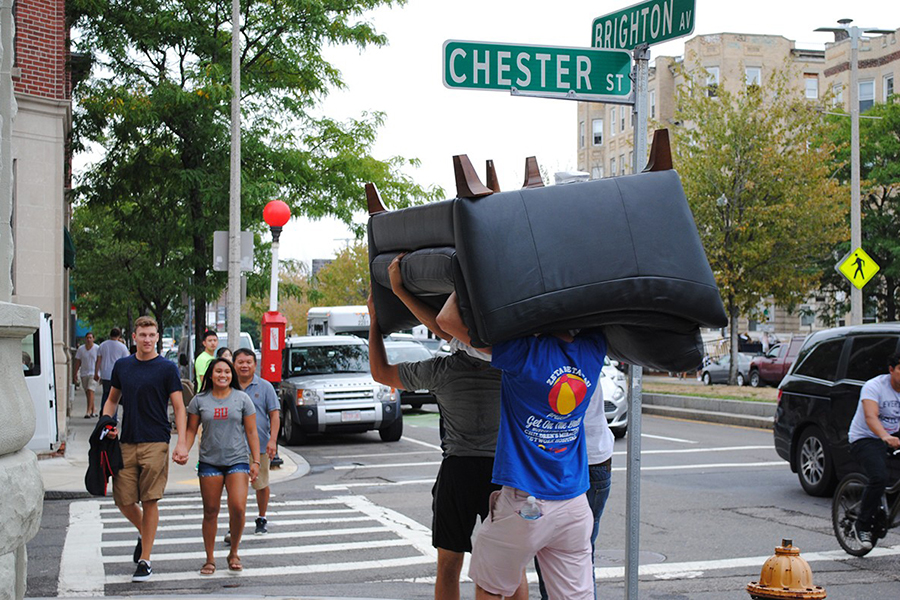Your Questions About Renters Insurance, Answered
Do you actually need it? Jim Hyatt of Arbella Insurance breaks it down.

A scene from Allston Christmas in 2016 / Photo by Madeline Bilis
It’s almost here. The weekend when almost two-thirds of Boston’s apartment leases turn over. The weekend when mattresses are thrown out of windows. The weekend when thousands of students descend upon the city, filling the sidewalks with discarded cardboard boxes and clogging up the T with their backpacks.
As renters ready to enter into their September 1st leases, they might consider purchasing renters insurance to cover all of the stuff they just lugged to their fifth-floor walkup. Jim Hyatt, senior vice president of personal lines at Arbella Insurance, answered a few of our questions about renters insurance policies. As you might expect, he thinks you should get one.
To start, what is renters insurance?
A renters insurance policy is something people will buy to protect the things they own while they’re renting an apartment or a house. It covers all of the things people moving into the city this weekend are bringing with them. They’re bringing their clothes, their TVs, hiking equipment, bikes, ski equipment, whatever they have. Their couches, some furniture, some bedding—all that stuff inside the apartment—that’s what renters insurance is designed to protect.
This is something you pay for separately from rent, right?
Yes. There’s a huge misperception out there about renters insurance. Whenever I talk to renters, especially young ones coming into the city, people think that when they sign the lease, the landlord becomes magically responsible for the insurance on their stuff. And that’s just simply not the case. That misperception has cost a lot of people a lot of heartache.
Like?
Arbella insures a lot of individuals like renters, homeowners, and people with cars. But we also insure commercial properties like apartment buildings. A few months ago we had a fairly new apartment building that had a major fire. It was devastating. Our commercial policy paid for the complex itself, so the building, the elevators, the cabinets, countertops, etc., within each of the units. But it didn’t pay for peoples’ televisions, clothes, or things like that. We find that, in the industry, only about a third of people who rent actually buy renters insurance. So out of the hundreds of people in this building who were renting, only about a third of them were able to collect for the fire, smoke, and water damage to their things. The other ones were left paying out of pocket, which was pretty scary.
Why do you think those two-thirds of people opted out?
Some people just think it’s expensive—which it isn’t. A renter’s policy can cost, on an annual basis, $150 or $200 for $15,000 or $20,000 worth of coverage. So it is very affordable for people, especially if you break it down on a weekly basis. It’s $5 or $6 a week. It’s really pretty cheap. And a lot of people say “Oh, you know, it’s never going to happen to me. Nobody’s going to rob my apartment.” But theft is really not the biggest cause of loss for people that rent. It’s actually water damage. So if you’re in an apartment building that has eight stories and a pipe bursts on the seventh floor, all the apartments in the six floors below it are going to have some significant water damage. The question that’s important to pose to people is: Do you have enough money in your bank account to go out and replace everything you own tomorrow? Most people don’t, right? Do they have $15,000 or $20,000? The answer is no.
What do you say to the students moving to Allston who think they don’t have anything of value to insure? They might be under the impression that to get insurance, you need to own expensive things. Maybe they just bought all of their stuff at Target.
Sometimes I answer that question by turning and asking the parents, “Well, if your son or daughter doesn’t have insurance and they lose everything in a fire or everything’s totally damaged by water, who are they going to turn to to replace all of that stuff?” And the parents are like “Gulp, that’s gonna be me.” Then it starts changing to, “OK, let’s start talking about how much renters insurance would actually cost.”
How do you figure out how much insurance you need based on what you own?
It’s not an exact science but there are a number of online tools and calculators. They’ll ask you questions about the things you own. You can get down into the heads and tails of how many couches and chairs and TVs you have and how old they are. That’ll help you determine how much it would cost to replace them. You can also work with an inventory tool that asks you about the amount of clothes you have based on what climate you live in. It helps you value everything you own to determine “I need at least $12,000 of coverage.” When you go through the process, even if you’re just estimating at a higher level, it adds up pretty quickly. Most policies will also have a $500 deductible. That is very standard in the industry today.
How tough is it to sign up for renters insurance online, rather than scheduling an appointment with an agent?
It’s not labor intensive at all. There’s not a lot of information needed, quite frankly. It’s really just: where is the apartment and how much insurance do you need? Another way to save money on insurance is combining a renters policy with a car insurance policy. You can actually save money if you bundle them together with the same company.
What do you tell the people who think they don’t need it?
You’re crazy if you don’t [get a policy]. You’re really taking a lot of risk onto your own shoulders. People always think “I’m really careful. I can always lock my bike up. Nothing’s going to happen to me.” That may be very true, but you can’t count on what other people are going to do. And that’s where the surprises happen.
Answers have been edited and condensed for clarity.


